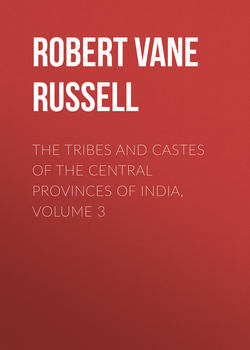Читать книгу The Tribes and Castes of the Central Provinces of India, Volume 3 - Robert Vane Russell - Страница 64
Gond
(f) Religion
46. Charms and magic
ОглавлениеWhen they think a child has been overlooked they fetch a strip of leather from the Chamār’s house, make it into a little bag, fill it with scrapings from a clean bit of leather, and hang it round the child’s neck. If a child is ill they sometimes fetch from the Chamār’s house water which has been used for tanning and give it him to drink. If a man is possessed by an evil spirit, they will take some coins, silver for preference, and wave them round his head with a lamp, and take them out and bury them in a waste place. They throw one or two more rupees on the surface of the soil in which they have buried the coins. Then they think the spirit will leave the sufferer, and if any one picks up the coins on the surface of the ground the spirit will possess him. Hindus who find such buried coins frequently refuse to take them, even though they may be valuable, from fear of being possessed by the spirit. Occasionally a man of a treacherous disposition may transfer an evil spirit, which is haunting him, with a daughter in marriage. The husband’s family suspect this if a spirit begins to trouble them. A Vaddai or magician is called, and he tries to transfer the spirit to a fowl or goat by giving the latter some rice to eat. If the spirit then ceases troubling they conclude that it was transferred by the bride’s father, and go to him and reproach him. If he admits that he had a spirit in his family which has given no trouble lately, they ask him to take it back, even though he may not have intended its transfer. The goat or fowl to which the spirit was transferred is then sacrificed in its name and the meat is eaten only by the father-in-law’s family, to whom the spirit thus returns. A miniature hut is built for the spirit in his yard, and a pot, a lamp and a knife are placed in the hut for its use, and an offering of a goat is made to the spirit occasionally at festivals.
In order to injure an enemy they will make an image of him in clay, preferably taken from underneath his footprint, and carry it to the cemetery. Here they offer red lead, red thread, bangles, and various kinds of grain and pulse to the ghosts and say to them, “Male and female deities, old and newly buried, maimed and lame, spirits of the wind, I pronounce this charm with your help.” Then they pierce the figure with arrows in the chest and cut it with a knife in the region of the liver and think that their enemy will die. Another method is to draw the likeness of an enemy on cloth with lime or charcoal, and bury it in a pot in front of his house on a Sunday or Tuesday night so that he may walk on it in the morning, when they hope that the same result will be achieved.
In order to breed a quarrel in an enemy’s house they get the feathers of a crow, or the seeds of the amaltās,73 or porcupine needles, and after smoking them over a fire in which some nails have been placed, tie them to the eaves of his house, repeating some charm. The seeds of the amaltās rattle in their pods in the wind, and hence it is supposed that they will produce a noise of quarrelling. Porcupine’s quills are sharp and prickly, and crow’s feathers are perhaps efficacious because the crow is supposed to be a talkative and quarrelsome bird. The nails in the fire, being sharp-pointed, may be meant to add potency to the charm. One who wishes to transfer sickness to another person obtains a cloth belonging to the latter and draws two human figures on it, one right side up and the other upside down, in lamp-black. After saying charms over the cloth he puts it back surreptitiously in the owner’s house. When people are ill they make a vow to some god that if they recover they will sacrifice a certain number of animals proportionate to the severity of the illness. If the patient then recovers, and the vow is for a larger number of animals than he can afford, he sets fire to a piece of forest so that a number of animals may be burnt as an offering to the god, and his vow may thus be fulfilled. This practice has no doubt gone out owing to the conservation of forests.
73
Cassia fistula.
